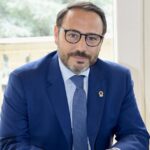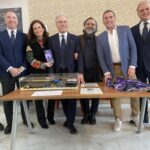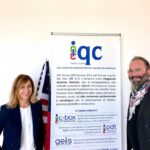The excellence of teaching in Campania
In the beautiful Palazzo Spinelli di Cariati, an enchanting structure dating back to the sixteenth century, lives the Pontano Institute; a school of the Jesuit Education network that over the years has formed great personalities of excellence who have operated, and still work very actively, in the intelligentsia not only Neapolitan but also Italian. For over a century, for about 140 years, this wonderful institute of the Vittorio Emanuele Course in Naples has been involved in the training of young people through what is called the Cura Personalis, an Ignatia’s educational method that puts the focus of attention the pupil, his person, his uniqueness to extrapolate his potential, attitudes and passions, so that he can reach full awareness. “Taking care of young personalities who approach the world with curiosity and fear is a great responsibility, not only in their cultural and educational formation but also in the search for their human growth! This is why we must accompany them and support them with strength and understanding!” asserts Emma Armentano, Dean of the Institute.
by Roberta Imbimbo
Prof. Armentano, what distinguishes the Pontano from other schools?
The Pontano has always been a vivid cultural center that, over the years, has hosted great personalities from the political, university, artistic and intellectual worlds with whom the children had the privilege of interacting both in curricular hours and extracurricular. Last November, for example, we organized a real symposium, called Domus Cura, which was attended by Sergio Costa, Minister of the Environment, and Father Jimmy Bartolo SJ, President of the Jesuit Education Foundation. In March, however, we will host Francesco Sabatini, honorary president of the Academy of the Crusader, to allow young people to talk with numerous prominent personalities who can help to increase their personal background, taking them far beyond the goal of academic excellence alone. All this takes place in an extremely serene and positive climate: the children perceive, in fact, to be part of a “great family” entrusted with the noble mission of preparing the pupils to meet the challenges they will face, with a strong and determined spirit , aware of its potential, able to develop an autonomous, critical and free thought.
How do you train your young people?
The training of future citizens takes place through the Personal Care, an Ignatian educational method that, by paying attention to the individual, consists of accompanying the student individually in his educational and educational path, motivating him and encouraging him into learning, initiating him to self-knowledge and gradually leading him towards self-assessment. The main means of implementing this educational method is the individual history, specifically provided for by the pedagogy of the schools of the Jesuit Education network. but also growth and guidance.
Can you tell us about the strengths of the Institute?
One of the main strengths is certainly the team, formed by Professor Veronica Petito on the mandate of the Jesuit Education Foundation, composed of teachers of undisputed human and professional qualities. A very united team, perfectly immersed in the network of Italian and foreign Ignatian schools, extremely convinced that they can make their contribution by embodying the Ignatian values in the teaching process. Values that aim at a teaching of excellence, discipline and to develop a strong critical spirit in the pupils. Another strong point is the close school-family synergy, a constant relationship of fruitful collaboration to ensure the support and support they need. The flagship of our school is also the Pontano Music Academy, chaired by Pasquale Antonio “Cicci” Serra and directed by Francesco Capriello; born with the aim of providing students with the means and knowledge necessary to cultivate their particular vocations in an increasingly mature and conscious way, it enhances musical study as an educational experience of the individual. It is a highly qualified academy, composed of masters and musicians of great talent of international level and that among other things often organizes important performances that see the participation of great guests.
Another peculiarity of yours is certainly knowing how to deal brilliantly with the current educational challenges that affect the school system, adequately welcoming pupils with “special” educational needs.
Exactly. The key to our educational success is integration, a great source of wealth to know different traditions and realities. Since our school is attended by students of different ethnicities and religions, one of our priority objectives is to help create the conditions for proper reception. A school that is a factor of social promotion, a harbinger of equal opportunities for all and really attentive to inclusion, able to welcome pupils who present particular fragility and to provide adequate answers to their difficulties.
The Pontano is a school that combines tradition and innovation. By focusing on this last point, can you tell us about the reforms you have made lately?
As you rightly said, the innovations of the Pontano are rooted in tradition: our idea of schooling is in fact to create a welcoming environment, in which children can receive 360-degree training, not only by studying but also taking care of other types of activities that are already in vogue: in fact, at the end of the lessons, you can take a course of theater, music, or practice different sports disciplines (the Pontano adheres to the MIUR platform for student athletes who practice the high-level sports for which personalised teaching courses are planned).
What exactly distinguishes the Pontano from the other schools? The Ignatian charisma, the welcome, the being able to dialogue with the pupil looking for the key of human and emotional contact, listening and observing before designing. Our school continues its history path thanks to Pasquale Antonio “Cicci” Serra, President of the CDA del Pontano and the LAUS Foundation, a strong and determined man who wanted to focus strongly on innovation in tradition: in his foresight he is in fact, he was able to create great cultural innovations, working with the Jesuit Movement and Action for Development (MAGIS) of the Society of Jesus: in this perspective, for example, the entire proceeds of the records produced by the Pontano Music Academy was donated to Jesuit missions in India and Africa, thus combining music and solidarity. The LAUS Foundation, for its part, offers scholarships to deserving students and in particular to those who are otherwise Neapolitan, as stated by President Serra himself, that is, to the deserving foreign children to whom the Foundation gives scholarships to make in so that they can attend Pontano, one of the most prestigious colleges here in Naples. An institution with 140 years of history behind it, but always looking to the future: in an increasingly interconnected world, in fact, it could not but open itself to the use of technologies in school, provided it is used in a conscious and productive way. What’s more, the Pontano has been a pioneer in the use of iPads in teaching, well aware that that learning accelerator, if properly used, not only allows to deepen knowledge, but also has an important role in training generations, encouraging the acquisition of digital skills that are fundamental in today’s life.
From this year she, formerly a professor of Latin and Greek and a writer, is at the head of a prestigious institute; what has inspired your career path all these years?
The firm belief that there is nothing more beautiful in the world than injecting knowledge into others, of elevating the minds of their pupils and making them aware and competent. Teaching is a truly extraordinary task, one that requires great energy and that can not ignore the fact that while teaching you can learn something. Seneca said, Homines dum docent discunt, or men as they teach, they learn: contact, exchange of words and glances with boys transmit emotions that nourish our thinking and our soul. I believe in the educational project that the Ignatius approach offers, such as the formation of values, an essential foundation for “proud” teenagers who here begin to build their future and we urge them to strive to always look up to become adults capable of doing great things but above all of loving, of being honest men and women. Parents entrust us with the most precious, most important thing they have, their children and then, imposing it is certainly, a serene context, in which great value is given to the acquisition of the knowledge that certain things, such as study, are not only a duty but a privilege , a privilege that is enucleous in an environment of emotionality and educational excellence.
For more info: www.istitutopontano.it

























































